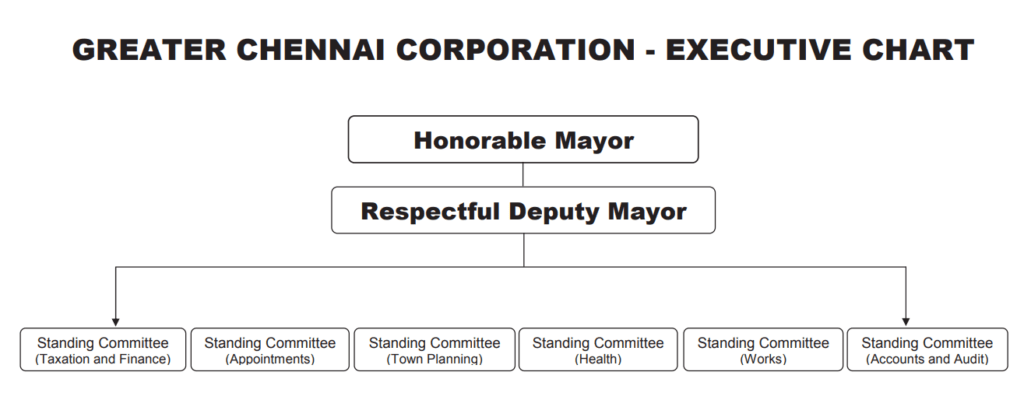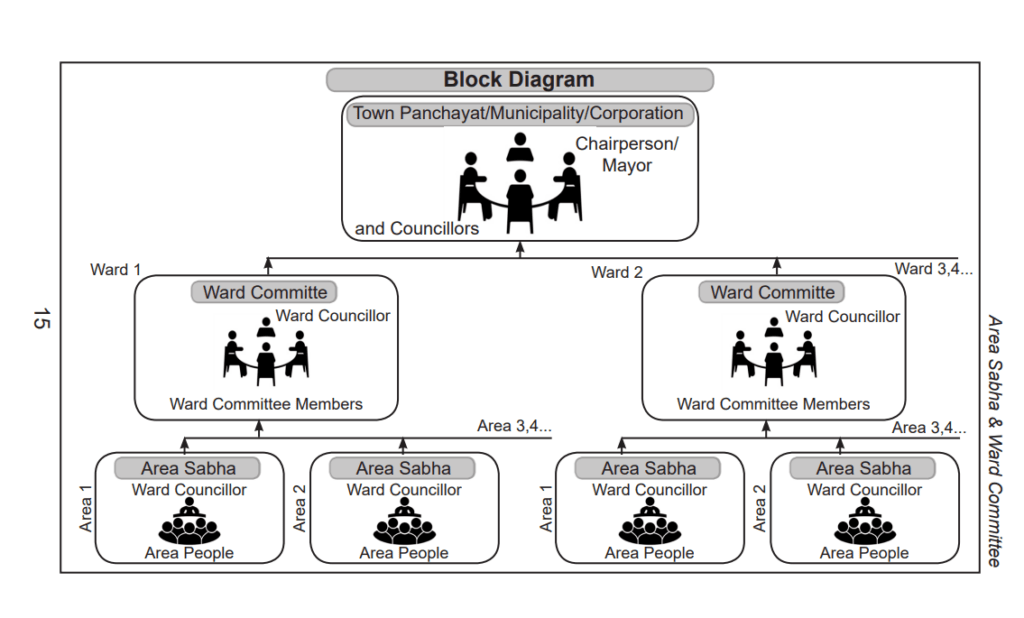“Local ward councillors are the bridge between the public and the Corporation. They are responsible for the most basic amenities for a citizen to lead a comfortable life,” says M. Mahesh Kumar, the Deputy Mayor of the Greater Chennai Corporation (GCC).
Chennai did not have an elected council for six years until the local body elections were held in 2022.
“Previously, the officials looked after local governance. There would not have been a chance for the people and the officials to have approached each other about civic matters regularly. But, today, we have ward councillors chosen by the people. They interact with residents daily, gauging their issues and needs to steer local governance effectively,” says the Deputy Mayor on the importance of having an elected council in Chennai.
Knowing how the elected council works is a crucial step in understanding the various aspects of local governance in Chennai.
Read more: Explained: How GCC administers the city and why we need an elected council
Composition and hierarchy of the elected council in Chennai
GCC has 200 wards, the most basic administrative unit, in Chennai. Each ward has a councillor, who are elected directly by the people through local body polls. The 200 wards come under 15 zones. In other words, a group of wards make up a zone. Again, the councillors elect one among them to head the zones in Chennai.

The 200 councillors also elect a Mayor and a Deputy Mayor from among them. The current Mayor of GCC is Priya Rajan, who is also the councillor of Ward 74 and Deputy Mayor M Mahesh Kumar represents Ward 169.
The six administrative subjects – taxation and finance, town planning, appointments, health, works and accounts and audit – have separate Standing Committees. Each committee has 15 members and a chairman, who are indirectly elected by all the councillors.
The entire elected council in Chennai has a tenure of five years. The running of the council is governed by the Chennai City Municipal Corporation Act, 1919 or the C.C.M.C. Act (1919).
“Ward councillors of Chennai work with the Assistant Engineers to prepare estimation and plans for civic works [like constructing new pavements]. This estimation would go to the Zonal office to be discussed and passed to the respective Standing Committees in GCC for approval and budget allocation,” says the Deputy Mayor of the elected council’s functioning in Chennai.
Additionally, each councillor gets Rs. 35 lakhs per year as part of the Ward Development Fund. “I have allotted a portion of the fund to set up new PDS shops, as per public demand in my ward,” says the Deputy Mayor and Councillor of Ward 169.
Meetings of the elected council in Chennai
Council meeting: The Mayor convenes a council meeting with councillors and key officials like the Commissioner and Deputy Commissioners of the GCC every month in the Ripon Building. In the meeting, they discuss civic issues, the status of tenders and administrative matters. Resolutions are passed on various issues and are sent to the respective Departments or Zonal Offices for processing and compliance.
In the previous Council Meeting in December 2022, councillors raised the issue of poor waste management and the laxity of the conservancy workers. The Commissioner responded that GCC is working on a mobile application to track the attendance of conservancy workers.
Zonal meetings: “All the ward councillors of a particular zone convene once a month. Officials from civic agencies like GCC, Metro Water and TNEB join. Then, councillors share the issues and needs in their ward. For example, they ask for sewerage or street lights if some parts of their wards lack these amenities. Then, we process these civic requests and send them to standing committees. Then, they process it and pass the resolution. After that, tenders will be issued for the projects,” says R Durai Raj chairman of Zone 13 on the role of Zonal meetings.
Standing committee meetings: These meetings happen once a month with 15 members and officials. “Elected representatives take a part in administrative subject-related decisions,” says Gurusaravanan. “It will not be just in the hands of officials.”
Fathima Ahamath, councillor of Ward 61, is a member of the Standing Committee of Education. “We look after corporation schools, playgrounds, parks and anganwadis,” she says.
“An issue was discussed about Corporation school students recently. Until quarterly and half-yearly examinations, they do not get new sets of books and uniforms, because the total number of students varies until the exams commence. We raised this matter and asked that students must get new books and uniforms on the first day of the academic year, keeping a 10% of the student population as buffering. The Standing Committee of Education has agreed to implement this from the upcoming academic year,” says Fathima.
Read more: Councillor talk: Improving roads the aim for Fathima Ahamath of Ward 61 – Egmore
Should councillors get a salary in Chennai?
Currently, the ward councillor position is an honourary position in Chennai. The C.C.M.C Act (1919) also does not mandate that councillors must be paid.
In the previous council meeting, Fathima raised the issue of salary for councillors. “When MLAs and MPs are paid, why not councillors? Aren’t we also public servants? If salary is not possible, at least give us tablets for administrative purposes.”
“When I took charge as the councillor in Ward 61, I was given an office, table and chair. In a digital world, we should get a personal computer, at least. Moreover, we are only paid Rs. 800 per Council Meeting as honorarium, which itself is not enough. I am spending almost half a day attending the Council Meeting,” reasons Fathima.
“I can manage because I also have a business to support me. But many councillors hail from different financial backgrounds. They will benefit from the salary,” says Fathima.
“The trend of not paying councillors goes back to colonial times,” says Charu Govindan, the Founder-Member and Coordinator at Voice of People, a non-partisan, voluntary civil society organisation, working towards a people-participatory democracy. “Earlier, the councillor positions were held by the elites, during the British era. After independence also, the precedent is carrying on.”
“The state can amend the C.C.M.C Act (1919) to make way for a provision to provide salaries for the councillors,” says Mythreyi Mugundan, an urban policy researcher with Janaagraha.
“In the current day, paying our councillors, say, Rs. 25,000-30,000 would be beneficial for them,” says Charu.
Salaries can also reduce the trend of corruption by some councillors in Chennai. “There is a mindset that councillors must be paid in Chennai. So, few could demand bribes or get commissions from known contractors,” explains Fathima.
Charu also says that there will be more accountability when councillors get a salary. “People will know that their taxes are being used to pay the councillors. This will help them hold their elected representatives accountable in a much better way.”
Ward Councillors from states like Kerala and Telangana are paid.
Avenues of citizens’ participation
The state government passed the Tamil Nadu Municipal Laws (Amendment) Act, 2010 (Act. No 35 of 2010) regarding the inclusion of Area Sabhas and Ward Committees in urban local self-government. In 2022, the city civic body announced area sabha delimitation.
Read more: Area Sabhas and Ward Committees: Power to the people or power with the officials?
Similar to Gram Sabhas in rural areas, we have the Area Sabhas in cities, where the voters are the members and they are chaired by the respective ward councillors. Currently, each ward has 10 areas where the Sabhas will be held.
Also, a ward committee member is nominated from each of the 10 areas. The Ward committee will consist of the ward committee members, chaired by the ward councillor.
“Area Sabhas and Ward Committees must be held four times a year, that is, once in three months,” says Charu.
“In addition to only talking about civic problems and grievances, people must suggest development projects in their areas for better local governance,” says M Gurusaravanan, Chairperson at the Institute of Grassroots Governance, a registered professional society aiming to build a local governance movement in India. “This will help the councillor judiciously spend their ward development fund on projects that people really need.”
“We should not look at Area Sabhas and Ward Committees as mere novelty factors which will lose their momentum down the lane. A considerable amount of public participation will help these efforts sustain momentum and create impact,” says Mythreyi.
Knowledge about the elected council will help increase the voting percentage of local body elections in Chennai. This knowledge can be gained only via awareness campaigns. “When conservancy workers are asking people to give the waste to them instead of burning waste during Bhogi, why can’t the conservancy workers also announce area sabha dates, asking people to come and participate?” asks Charu.
Participation in area sabhas will help people meet other active residents and help grow civic participation in the city.
Need for transparency in local governance
“Most ward councillors have WhatsApp groups with residents and officials like Assistant and Executive Engineers. Residents can share their grievances with relevant photos and details, and this will help the elected representatives and authorities to take action,” says the Deputy Mayor.
“It is just another platform for grievance redressal. But such social media groups could turn out to be exclusionary, leaving out people who do not have access to mobile phones, the internet and social media. It is always appreciable when councillors meet with their residents in person to hear grievances and feedback,” says Srinivas Alavilli, the Head of Civic Participation, at Janaagraha.
Many councillors we spoke to say that they visit their ward frequently and are also active on social media.
“I would prefer the councillors tell us on which days of the week or the month they will be coming to our street. We can meet the councillor at that time and share our issues. I did not know that such WhatsApp groups exist where we can share about local civic issues in our neighbourhood. I will try to become a part of it,” says Saravana a resident of Valasaravakkam.
Local citizen activists also request for live-streaming of council meetings, apart from publishing the minutes and agenda of the meeting in the public domain.
“We get to know what happens in the council meetings and the standing committee meetings only via the media. It would be great to know what happens in the meetings live, or have an unabridged version of it. When we can have a live telecast of state assembly meetings, why not local council meetings?” asks Charu.
Bruhat Bengaluru Mahanagara Palike (BBMP), the Bengaluru city government, live-streamed its sessions. “We hope Chennai will follow suit soon,” says Charu.
“Until now, there have not yet been talks about live-streaming council meetings. If people ask, we will raise it with the state government. If the state gives its nod, we will live-stream the council meetings,” says the Deputy Mayor.
How can you get involved?
- Know which ward you belong to.
- Know your ward councillors along with their phone numbers.
- With the Area Sabhas starting on 26th January, know which Area you belong to. Attend the Area Sabhas to raise your concerns and suggestions regarding the matters of your ward with your councillor.

With regard to payment of salary to the councilors, it was stated that if the councilors are paid salary, the trend of corruption will get reduced. The concillors know very well that they will not get paid for the job. If they still take up, well, it is basically because of the lure of power and pelf. Even if they get paid, still the councilors make good money out of various deals.